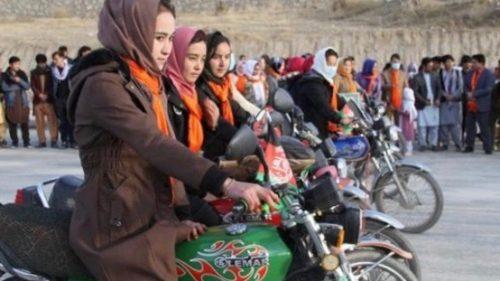Afghan Women Face an Uncertain Future as Taliban Grows Stronger

(Photo: via Afghanistan Times)
During his press conference on July 8, US president Joe Biden claimed that the US has achieved all its objectives in Afghanistan since the invasion in 2001. To make his point, he cited the capturing of Osama Bin Laden and the end to terrorism originating from Afghanistan. However, after two decades, the US is forced to leave the country with the Taliban re-emerging as the most important player. Amid this, Biden seems to have forgotten that protection of the rights of women was one of the main justifications for the invasion of Afghanistan.
Meanwhile, while there is a justified sense of betrayal towards the US’ unwillingness to confront the Taliban on this issues, Afghan women are gearing up for a fight to protect their rights despite the uncertainties of who will control power in the country.
Fear of yet another war
Women in Afghanistan have been among the worst victims of the country’s decades-long war. Ever since the fall of the socialist government in early 1990s, women have been denied crucial constitutional protection against the dominant conservative elements in society, who prefer women to remain within the confines of four walls. After the 2001 invasion, the so-called democratic governments in Afghanistan have failed to make any comprehensive difference to the condition of women’s lives. Some argue that conditions for women were better than during the erstwhile Taliban rule due to the presence of some form of stability and the emergence of civil society groups. But now, with the Taliban expected to regain power in the country, there is genuine fear among women in both urban and rural areas regarding the uncertainty and instability that may arise from yet another war.
The fear has increased primarily because of US actions with respect to the Taliban. The US failed to acknowledge the Taliban’s problematic past or demand a verified correction. Instead, it signed a deal allowing the Taliban to carry on its war against the current government which the US helped build, and accepted the Taliban’s participation in a future Afghan government.
The Taliban’s rule between 1996 and 2001 was marked by the brutal subjugation of women, who suffered numerous forms of primitive restrictions and punitive violence. Before announcing its withdrawal, the US failed to seek any assurance from the Taliban regarding the protection of basic human rights of all sections of society including women, which was one of its main slogans used to justify the war on Afghanistan.
Refuting the US claims of transformation, Heela Najibullah, an Afghan woman pursuing a PhD from the University of Zurich, told Peoples Dispatch that it is a known fact that the Taliban’s stance on women’s rights has not much altered from the 1990s. She also noted that during the talks with the US, the Taliban had refused to engage with women civil society groups directly and the US envoy had to act as a go-between. She wondered what would be the status of women and minorities in Afghanistan if the Taliban is allowed to govern as per its own interpretations of the Islamic sharia law, which are exclusive only to one particular section.
Peaceful resistance
With the increase in the Taliban’s power, news of women being subjected to forced marriages, public flogging, and other horrors have started emerging from remote areas. There are also reports of women being restricted to their homes and wear burqas in areas where the Taliban has gained control. In certain places, schools are being asked to shut down for women above the age of eight or 12.
Talking to Associated Press last week, Suhail Shaheen, spokesperson of the Taliban in Doha, said that women under Taliban rule would be “allowed” to go to school and work but they will be forced to wear the hijab or headscarf. He also mentioned that it would be necessary for women leaving the home to have a male companion.
The resurgence of the Taliban is already leading to a large number of Afghans, who can afford to do so, to leave the country or plan on it. However, the majority have no option but to stay back. Some Afghans have decided to fight. In early July, women took to the streets of Afghanistan with banners, and some with guns in hands, chanting anti-Taliban slogans. One of the biggest demonstrations was in the central Ghor province.
Najibullah argues that despite the attacks on women activists and scholars by the Taliban and other conservative forces, they would prefer to raise their voices in a more non-violent manner. However, she is apprehensive whether non-violent resistance will be effective in changing the Taliban’s brutal approach towards not only women and girls, but the people in general in Afghanistan.
Get the latest reports & analysis with people's perspective on Protests, movements & deep analytical videos, discussions of the current affairs in your Telegram app. Subscribe to NewsClick's Telegram channel & get Real-Time updates on stories, as they get published on our website.























